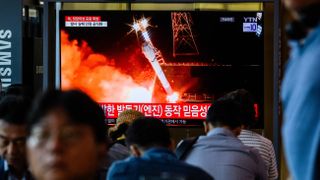
A television broadcast showing file footage of a North Korean launch, playing in a train station in Seoul, South Korea on May 28, 2024. The broadcast took place after North Korea announced it launched its Malligyong-1-1 spy satellite, but the rocket exploded during the mission.
(Image credit: Anthony Wallace/AFP via Getty Images)
United States officials condemned North Korea’s latest attempt to put a reconnaissance satellite in orbit, according to a report.
North Korea attempted to send a spy satellite into space on Monday (May 27). However, the rocket carrying that satellite exploded, according to multiple media sources quoting the state-controlled Korean Central News Agency. The country successfully placed its first reconnaissance satellite in orbit in November 2023, but two other more recent efforts besides Monday’s also ended in failure.
The Guardian, quoting North Korean officials, suggested the rocket’s failure was due to “the operational reliability of the newly developed liquid oxygen and oil engine.” The U.S. State Department said the launch breached edicts from the U.N. Security Council, according to a statement provided to The Korea Times.
“The United States condemns the (Democratic People’s Republic of Korea) DPRK’s May 27 launch, which incorporated technologies that are directly related to the DPRK’s ballistic missile program and took place in violation of multiple UNSC resolutions,” the statement read.
Related: North Korea claims it sent a spy satellite to orbit for 1st time: report
The U.N. Security Council has unanimously adopted nine sanctions against North Korea since 2006 because the country has been maturing its nuclear and missile program, according to the Arms Control Association. United States officials have also condemned past North Korean launches, saying the nation’s rocket program uses technologies that support its intercontinental ballistic missile program.
The latest launch took place at 10:44 p.m. local time (9:34 a.m. EDT or 1344 GMT) off the west coast of North Korea. Rocket debris fell in the nearby sea about two minutes after launch, according to Reuters, quoting the South Korean Joint Chiefs of Staff.
Breaking space news, the latest updates on rocket launches, skywatching events and more!
North Korea’s launch happened hours after a three-way summit between China, South Korea and Japan that was meant to focus on trade and cultural exchanges between the countries, although another hot topic surrounded security concerns raised by the U.S., according to the New York Times.
Both Japan and South Korea have repeatedly asked North Korea not to conduct launches, and South Korean President Yoon Suk Yeol and Japanese Prime Minister Fumio Kishida repeated these pleas at the summit, Reuters reported. Chinese premier Li Qiang, while not discussing the launch, asked for hostilities to be curtailed in the region.
Japan and South Korea are both allies of the United States and participants under the American led-Artemis Accords that, in part, aim to establish peaceful norms for space exploration.
North Korea, a communist state, has been cut off from the rest of the world for much of the last 80 years and its citizens lack basic services. That said, Russian prime minister Vladimir Putin met North Korean leader Kim Jong Un at Russia’s Vostochny Cosmodrome spaceport last year during a five-hour summit; Russia is currently an International Space Station partner, but working on a new alliance with China following Russia’s unsanctioned invasion of Ukraine in 2022.
China is forbidden from engaging in bilateral activities with NASA and the United States without express Congressional permission, under a 2011 decree known as the Wolf Amendment. China has been highly active in space in recent years, including with the development of missions to the moon and Mars and construction of the Tiangong space station for astronauts.
Join our Space Forums to keep talking space on the latest missions, night sky and more! And if you have a news tip, correction or comment, let us know at: [email protected].
Elizabeth Howell (she/her), Ph.D., is a staff writer in the spaceflight channel since 2022 covering diversity, education and gaming as well. She was contributing writer for Space.com for 10 years before joining full-time. Elizabeth’s reporting includes multiple exclusives with the White House and Office of the Vice-President of the United States, an exclusive conversation with aspiring space tourist (and NSYNC bassist) Lance Bass, speaking several times with the International Space Station, witnessing five human spaceflight launches on two continents, flying parabolic, working inside a spacesuit, and participating in a simulated Mars mission. Her latest book, “Why Am I Taller?”, is co-written with astronaut Dave Williams. Elizabeth holds a Ph.D. and M.Sc. in Space Studies from the University of North Dakota, a Bachelor of Journalism from Canada’s Carleton University and a Bachelor of History from Canada’s Athabasca University. Elizabeth is also a post-secondary instructor in communications and science at several institutions since 2015; her experience includes developing and teaching an astronomy course at Canada’s Algonquin College (with Indigenous content as well) to more than 1,000 students since 2020. Elizabeth first got interested in space after watching the movie Apollo 13 in 1996, and still wants to be an astronaut someday. Mastodon: https://qoto.org/@howellspace
>>> Read full article>>>
Copyright for syndicated content belongs to the linked Source : Space.com – https://www.space.com/north-korea-rocket-launch-may-28-security










